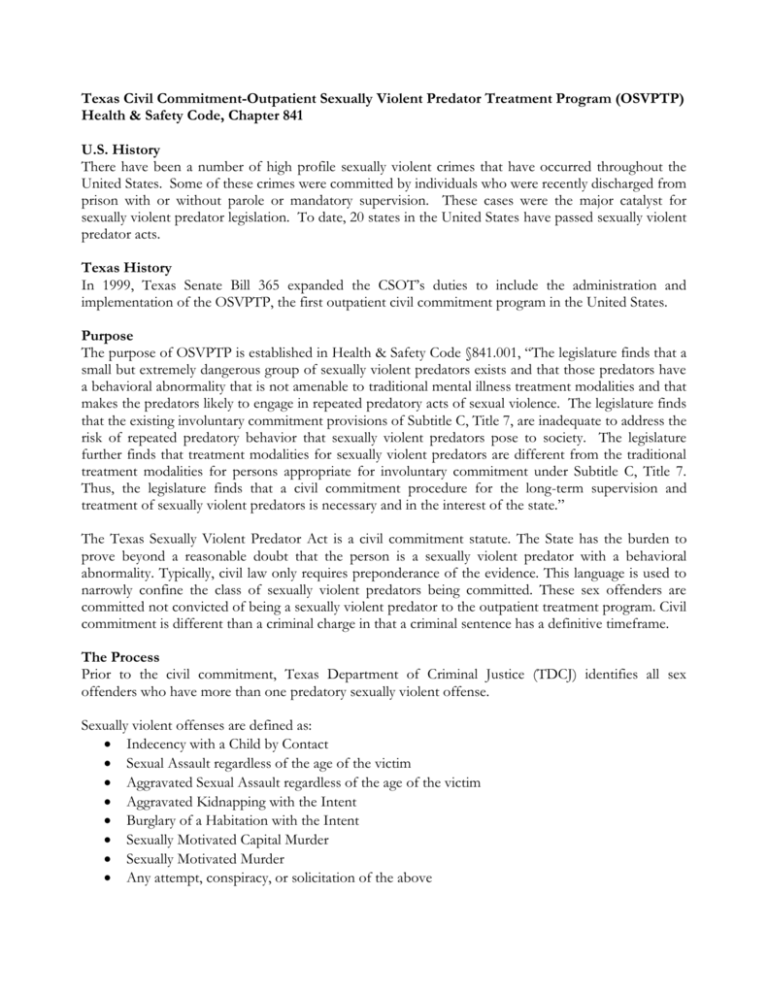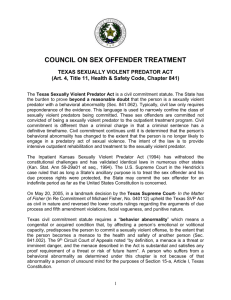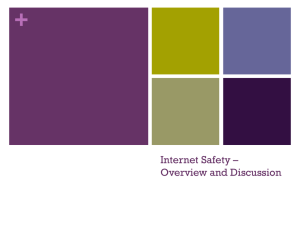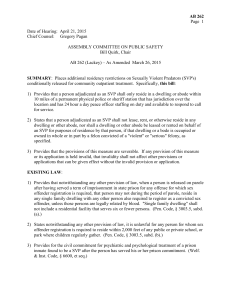
Texas Civil Commitment-Outpatient Sexually Violent Predator Treatment Program (OSVPTP)
Health & Safety Code, Chapter 841
U.S. History
There have been a number of high profile sexually violent crimes that have occurred throughout the
United States. Some of these crimes were committed by individuals who were recently discharged from
prison with or without parole or mandatory supervision. These cases were the major catalyst for
sexually violent predator legislation. To date, 20 states in the United States have passed sexually violent
predator acts.
Texas History
In 1999, Texas Senate Bill 365 expanded the CSOT’s duties to include the administration and
implementation of the OSVPTP, the first outpatient civil commitment program in the United States.
Purpose
The purpose of OSVPTP is established in Health & Safety Code §841.001, “The legislature finds that a
small but extremely dangerous group of sexually violent predators exists and that those predators have
a behavioral abnormality that is not amenable to traditional mental illness treatment modalities and that
makes the predators likely to engage in repeated predatory acts of sexual violence. The legislature finds
that the existing involuntary commitment provisions of Subtitle C, Title 7, are inadequate to address the
risk of repeated predatory behavior that sexually violent predators pose to society. The legislature
further finds that treatment modalities for sexually violent predators are different from the traditional
treatment modalities for persons appropriate for involuntary commitment under Subtitle C, Title 7.
Thus, the legislature finds that a civil commitment procedure for the long-term supervision and
treatment of sexually violent predators is necessary and in the interest of the state.”
The Texas Sexually Violent Predator Act is a civil commitment statute. The State has the burden to
prove beyond a reasonable doubt that the person is a sexually violent predator with a behavioral
abnormality. Typically, civil law only requires preponderance of the evidence. This language is used to
narrowly confine the class of sexually violent predators being committed. These sex offenders are
committed not convicted of being a sexually violent predator to the outpatient treatment program. Civil
commitment is different than a criminal charge in that a criminal sentence has a definitive timeframe.
The Process
Prior to the civil commitment, Texas Department of Criminal Justice (TDCJ) identifies all sex
offenders who have more than one predatory sexually violent offense.
Sexually violent offenses are defined as:
Indecency with a Child by Contact
Sexual Assault regardless of the age of the victim
Aggravated Sexual Assault regardless of the age of the victim
Aggravated Kidnapping with the Intent
Burglary of a Habitation with the Intent
Sexually Motivated Capital Murder
Sexually Motivated Murder
Any attempt, conspiracy, or solicitation of the above
Predatory act is defined as an act directed toward individuals, including family members for the primary
purpose of victimization.
Those cases are reviewed by a multidisciplinary team, which consists of representatives from the CSOT,
TDCJ, TDCJ-Victim Services, DSHS Mental Health Division, and the Department of Public Safety.
The multidisciplinary team refers sex offenders who meet the eligibility criteria for a behavioral
abnormality assessment. The multidisciplinary team:
1. assesses whether the person is a repeat sexually violent offender;
2. determines whether the person is likely to commit a sexually violent offense after release or
discharge; and
3. recommends the person for an assessment for a behavioral abnormality.
Multidisciplinary Team Statistics
Sex offenders referred for a behavioral abnormality assessment (average of 35 cases per month
reviewed):
FY 06
FY 07
FY 08
Total
115
102
100
317
TDCJ contracts with an expert to conduct the initial assessment, which includes a clinical interview,
psychological testing, review of the risk assessments, institutional records, and all relevant medical and
psychological records and reports. If a behavioral abnormality is identified, the case is referred to the
Special Prosecution Unit to determine whether to file a petition for a trial to seek a commitment of the
individual. The Special Prosecution Unit is responsible for initiating and pursuing a civil commitment.
If the Special Prosecution Unit (SPU) files a petition alleging a predator status, the State Counsel for
Offenders (SCFO) is notified and provides representation in the civil commitment proceeding. If
SCFO is unable to represent, the court shall appoint other counsel.
All civil commitment trials are held in Montgomery County, Texas (435th District Court, Presiding
Judge Mike Seiler). A judge or twelve person jury must unanimously answer “yes” beyond a reasonable
doubt to the following questions:
1. Is the person a repeat sexually violent offender?
2. Does the person suffer from a behavioral abnormality that makes him/her likely to engage
in a predatory act of sexual violence?
If the judge or jury unanimously responds “yes” to both questions, the person is ordered into the
OSVPTP program upon release from prison. The judge shall impose on the person requirements
necessary to ensure the person's compliance with treatment and supervision and to protect the
community. The requirements shall include:
(1) requiring the person to reside in a Texas residential facility under contract with the
council or at another location or facility approved by the council;
(2) prohibiting the person's contact with a victim or potential victim of the person;
(3) prohibiting the person's possession or use of alcohol, inhalants, or a controlled
substance;
(4) requiring the person's participation in and compliance with a specific course of
treatment;
(5) requiring the person to:
(A) submit to tracking under a particular type of tracking service and to any
other appropriate supervision; and
(B) refrain from tampering with, altering, modifying, obstructing, or
manipulating the tracking equipment;
(6) prohibiting the person from changing the person's residence without prior
authorization from the judge and from leaving the state without that prior
authorization;
(7) if determined appropriate by the judge, establishing a child safety zone in the same
manner as a child safety zone is established by a judge under Section 13B, Article
42.12, Code of Criminal Procedure, and requiring the person to comply with
requirements related to the safety zone;
(8) requiring the person to notify the case manager immediately but in any event within
24 hours of any change in the person's status that affects proper treatment and
supervision, including a change in the person's physical health or job status and
including any incarceration of the person; and
(9) any other requirements determined necessary by the judge.
(b) A tracking service to which a person is required to submit under Subsection (a)(5) must:
(1) track the person's location in real time;
(2) be able to provide a real-time report of the person's location to the case manager at
the case manager's request; and
(3) periodically provide a cumulative report of the person's location to the case
manager.
After the trial and prior to entering the program, the court coordinator identifies the county of
residence for the judicial order and testifies regarding program requirements. The court coordinator
coordinates transportation and residential placement for the SVP.
As administrator of the OSVPTP, the CSOT is responsible for the following but not limited to:
Comprehensive case management supervision
Residential housing requirements (if applicable)
Intensive sex offender treatment (Intake, Groups, Individuals, Family Sessions, etc.)
Anti-androgen medication
Mandated polygraphs (Instant Offense, Sexual History, Maintenance, and Monitoring)
Mandated penile plethysmographs
Biennial examinations
Restricted transportation
Substance use testing
Compliance with DPS registration every 30 days
Compliance with the1000 foot child safety zone
***A civilly committed person who is not indigent is responsible for the cost of the Global Positioning
Satellite (GPS) tracking service and shall pay to the Council the amount the Council determines will be
necessary to defray the cost of operating
The court coordinator conducts a face-to-face visit with the SVP on the prison unit and explains the
requirements of the OSVPTP program. The court coordinator forwards all SVP documentation to the
program’s Central Office, Department of Public Safety, the assigned case manager, and treatment
provider. Upon arrival at the residential facility, the case manager meets with the SVP and activates the
GPS tracking. In Dallas, Tarrant, and Harris counties, the case managers monitor GPS tracking, and in
Travis, Bexar, and El Paso counties, Department of Public Safety monitors GPS tracking. The case
manager makes the appropriate referrals based on the SVP’s needs.
The SVP is assessed by the licensed sex offender treatment provider, who conducts group, individual,
and family therapy sessions, prepares the individual treatment plan, prepares the SVP for polygraph
examinations, and makes appropriate referrals. Each year the SVP has the right to petition the court
for an unauthorized release from the OSVPTP. Every two years the SVP is afforded a biennial review.
The judge shall set a hearing if the judge determines at the biennial review that a requirement imposed
on the person under this chapter should be modified or probable cause exists to believe that the
person's behavioral abnormality has changed to the extent that the person is no longer likely to engage
in a predatory act of sexual violence. The state must prove beyond a reasonable doubt that the
behavioral abnormality has not changed. If the burden of proof is met, the SVP civil commitment will
continue.
If the SVP fails to comply with the order of commitment, he/she may be charged with a 3rd degree
felony, which may result in incarceration in the TDCJ-Institutional Division.
Of primary importance and the most compelling statistic for the success of this program is that none of
the SVPs committed to the program have been charged with or convicted of a new sexual crime.
There have been no instances of sexual re-offending. The program has protected the public from
repeat sexual offenses by the civilly committed SVPs.
Civil Commitments by Fiscal Year
Since civil commitment of the first SVPs in fiscal year (FY) 2001, the number of commitments
remained relatively stable at 7-14 civil commitments per year through FY 2007. Additional funding for
civil commitment trials was allocated to the Special Prosecutions Unit in FY 2008, which resulted in 28
civil commitments. Fifty trials are projected for FY 2009 and FY 2010.
FY 01
FY 02
FY 03
FY 04
FY 05
FY 06
FY 07
FY 08
FY 09
FY 10
7
11
13
10
11
14
8
28
50 Projected
50 Projected
Cost/Staffing
Texas is the only state that serves all SVPs in an outpatient setting, which has proven to be more
economical than traditional inpatient programs. Fiscal year 2008 performance measures reflect that the
outpatient Sex Offender Treatment/Supervision program cost the state an average of $26,371 per SVP
per year. Comparatively, other states that have inpatient SVP treatment programs report costs between
$41,000 and $166,000 per SVP per year. (Washington State Institute for Public Policy, 2006).
The outpatient Sex Offender Treatment/Supervision program is funded via an appropriation to the
Texas Comptroller of Public Accounts. The 80th Legislature Regular Session House Bill 1 (General
Appropriations Act) appropriated funds to the Texas Comptroller of Public Accounts for the
outpatient sex offender treatment and supervision program in the Texas Comptroller of Public
Accounts Judiciary Section’s 2008-2009 appropriation in Strategy D.1.9. An interagency contract
between the two agencies defines the disbursements of the funds to DSHS. The total amount
appropriated for FY 2008 is $2,840,656, and $3,039,193 is appropriated for FY 2009. The funds are
located in DSHS strategy D.4.1.7, Sex Offender Treatment/Supervision.
Due to the growth of the program and to improve cost efficiency, the program moved from contracted
case management to full time, state employee case management in 2005. Under contracted case
managers, the program cost an average of $36,480 per client per year for SVPs residing in the
community; this cost included treatment, supervision, housing, transportation, biennial examinations,
and various required testing. With the use of full time, state employee case managers, the program cost
an average of $26,371 per client per year for SVPs residing in the community; this cost includes
treatment, supervision, housing, transportation, biennial examinations, and various required testing.
Last Updated May 2009











